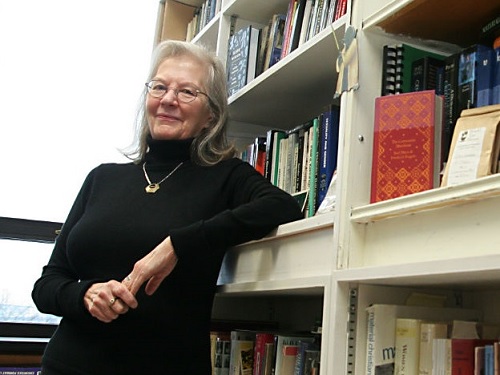For Mount Saint Vincent University Cultural Studies program coordinator and professor Dr. Randi Warne, the Mount’s small size means big space to do interesting things.
 Dr. Warne points out that the Mount was one of only a handful of universities with a free standing Cultural Studies department for some time – more have followed suit in recent years. “Cultural Studies is attractive to students because it is applicable across a range of careers and life experiences,” says Dr. Warne. “As a result, Cultural Studies has proven to be a distinctive part of the Mount. Our students are now working all over the place from both geographic and professional perspectives.”
Dr. Warne points out that the Mount was one of only a handful of universities with a free standing Cultural Studies department for some time – more have followed suit in recent years. “Cultural Studies is attractive to students because it is applicable across a range of careers and life experiences,” says Dr. Warne. “As a result, Cultural Studies has proven to be a distinctive part of the Mount. Our students are now working all over the place from both geographic and professional perspectives.”Students pursuing Cultural Studies courses come together from a variety of disciplines. The courses provide learning opportunities that “meet students where they are, enabling them to study their own worlds and critically analyze their own location as well as those of others.”
In a nutshell, the program explores the nature and criticism of culture and the arts (literature, film, visual art and pop culture). Multidisciplinary perspectives are critical in analyses of socio-political conditions in which thought and expression take place. In Dr. Warne’s words, “We ask the question behind the question, behind the question – always pushing boundaries.”
Courses in Cultural Studies frequently incorporate analysis of current topics and trends. For example, Cultural Studies 2201: Critical Debates (to be offered this fall), will focus on regulation of the body – and more specifically, drugs. The course analyzes how the substances we consume, and the regulations and proscriptions around those substances, shape our individual and social lives. It will explore how societies organize what is licit and illicit. Students will start with the problem of definition: what is/is not a drug? (Hint – water is a drug. Find out why.) Of course, plenty of discussion can be expected about implications of the impending legalization of recreational cannabis in Canada.
However, the course won’t be limited to a Canadian context. Students will look at Portugal’s response to their drug problem and how that country sought to fight the increasing power of drug cartels through legalization – a shift toward a harm reduction model and away from a punitive approach.
 The course will also explore how society deals with drug addicts and drugs in historical contexts. (Did you know that until the 1920s 7-Up contained lithium citrate, a mood stabilizing drug?). Course materials will include a blend of texts and videos, from Dan Malleck’s When Good Drugs Go Bad and Aldous Huxley’s futuristic novel Brave New World, to a video series on Victorian pharmacies. “Our discussions reflect student interests in relation to the course material,” Dr. Warne notes.
The course will also explore how society deals with drug addicts and drugs in historical contexts. (Did you know that until the 1920s 7-Up contained lithium citrate, a mood stabilizing drug?). Course materials will include a blend of texts and videos, from Dan Malleck’s When Good Drugs Go Bad and Aldous Huxley’s futuristic novel Brave New World, to a video series on Victorian pharmacies. “Our discussions reflect student interests in relation to the course material,” Dr. Warne notes.
“Cultural Studies introduces students to like minds and unlike minds – common interests, but not common identity.”
– Dr. Randi Warne
Other courses coming up in Cultural Studies will explore evil (students can take Evil or Advanced Evil, or both!), Canadian cultural studies, subcultures, film genres, censorship & art, music and culture, Canadian women film directors and more. (See the Cultural Studies annual booklet for more, as new courses are added every year)
Further, Dr. Warne points out, “The Mount Cultural Studies program is home to faculty whose diversity can really enrich students’ studies.” Instructor Mike McGuire is well-known for his courses on rap culture, and music and culture generally. He was also the sole Canadian to lecture aboard the international Peace Boat on its recent journey from Iceland to Canada. Dr. Matt MacLellan and Dr. Greg Canning are also regular instructors in the program – Dr. Canning taught film at the Mount for well over a decade, and Dr. MacLellan was recently named the recipient of an Exceptional Commitment to Students Award (presented by the Mount Students’ Union). Both Dr. MacLellan and Prof. McGuire took Cultural Studies courses when they were Mount students. Prof. McGuire even did a seminar presentation on Hip Hop when he was an undergraduate in Dr. Warne’s Religion and Popular Culture course.
That richness of diverse perspectives – among faculty and students alike – is at the core of the program. “Cultural Studies introduces students to like minds and unlike minds – common interests, but not common identity,” Dr. Warne concludes. “It is that diversity that makes Cultural Studies at the Mount an excellent fit with the institution’s values and goals.”
Cultural Studies is available as a major (within the Bachelor of Arts), a concentration, or a minor (open to all undergraduate students). Courses can also be taken as electives.